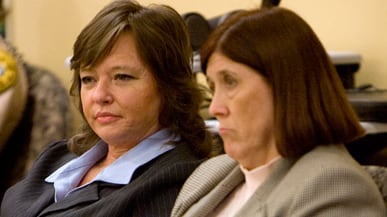Shawna Forde of Arizona was convicted Monday of killing a 9-year-old girl and her father. Terry Greene Sterling’s exclusive jailhouse interview with the beautician-turned-border vigilante. Forde maintains her innocence, describes the jury’s guilty verdict as “surreal,” and prepares for a possible death sentence.
On Valentine’s Day, after deliberating for about a day and a half, a Tucson jury convicted Shawna Forde of murdering 9-year-old Brisenia Flores and her dad, Raul, in a brutal 2009 home invasion on the Arizona border.

Forde, dressed in a navy-and-cream blazer and navy pants, remained calm as she listened to the verdict, even though the murder charges could lead to a death sentence in a state that does not shy from executions. The 43-year-old former child burglar, mom, beautician, and self-professed Minuteman from Everett, Washington, kept her composure, because, she told The Daily Beast in an exclusive post-verdict jailhouse interview, “you can’t freak out with the whole world watching you.”
Speaking by videophone in the Pima County Adult Detention Center, the woman prosecutors dubbed a braggart and a killer—who reportedly boasted she would “kick down doors and change America” with her border vigilante activities—maintained her innocence.
Wearing glasses, no makeup, and black-and-white striped jailhouse pajamas, Forde told me she was “extremely saddened” by the verdict. The jury of 11 women and one man also found Forde guilty of attempted murder, two counts of assault, two counts of robbery and one count of burglary. The jury gave a clear victory to prosecutors, who accused Forde of cooking up a plan to steal drugs and money from Raul Flores by gaining entry to his Arivaca, Arizona, mobile home with accomplices on the pretense of being law-enforcement officers in search of fugitives.
The verdict was “surreal” to Forde, but she said she took it like a “pro.” As the leader of Minutemen American Defense, or MAD, which she described as a large organization of patriots, she said she’d learned to “take things step by step, revamp, assess, and move forward.”
Forde, who said she’d lost a daughter herself, expressed sympathy for Gina Gonzalez, Brisenia’s mom and Raul’s wife. Gonzalez survived the horrific murders by playing dead. She testified that a woman who looked like Forde and a gunman gained entry into the family trailer by convincing her husband Raul they were police in search of fugitives. Within minutes, the gunman shot Raul, she said. Then he shot Gonzalez. Next, he pumped more rounds into Raul, killing him. As Gonzalez played dead on the floor, the gunman shot Brisenia twice in the head. Even though she was seriously wounded, Gonzalez called 911, seeking help for her dying child. But she said the woman who looked like Forde re-entered the trailer, found Gonzalez alive, and called to the gunman as she exited. Severely wounded, Gonzalez found her husband’s gun in the kitchen and shot the gunman in the leg when he entered the trailer again. (The gunman and another alleged accomplice face separate murder trials this year.)
“I wish I could say I was sorry it happened,” Forde said. “I am not sorry on my behalf because I didn’t do it.”
Brisenia’s murder became a political flashpoint among local Latinos, who became angered by the lack of outrage attending the young girl’s death. They compared the case to another borderlands murder mystery—the death of rancher Robert Krentz, which was widely blamed on a faceless Mexican narco and prompted the passage last year of Arizona’s notorious immigration law. Brisenia’s murder should have provoked similar outrage, Latinos said, but didn’t because she was a Mexican-American child.
Brisenia’s mother, Gina Gonzalez, could not pick Forde out of a photo lineup following the shootings. But she later said Forde “looked like” the camouflage-clad female home invader barking orders into a walkie talkie.
As the verdicts were read, Gonzalez, who has attended every day of the trial, began crying. Later, she smiled sadly and tearfully hugged prosecutors and police detectives, thanking them for their hard work.
“I know in her mind,” Forde said of Gonzalez, “I am guilty and she hates me. I know her tragedy is extremely sad.” But on the other hand, she said “people shouldn’t deal drugs if they have kids.” (No drugs were found in the trailer.)
Forde told me she’d “lost a daughter” and she knows from experience Gonzalez will feel pain “the rest of her life” and her “tragedy is extremely sad.” “I wish I could say I was sorry it happened,” Forde said. “I am not sorry on my behalf because I didn’t do it.”
She described her group, MAD, as a vital militarized outfit with a “coastal alliance” and an “air alliance” and about 13,000 members who aren’t “listed anywhere” because their work would be compromised and security would be breached.
That view of MAD contrasts sharply with testimony by Minutemen at the trial, who said only a few people showed up for a Forde-led “op” to round up unauthorized immigrants near Sasabe, Arizona, in 2007. Prosecutors characterized Minutemen as benign old guys who sit on lawn chairs and peer at the border with binoculars in search of migrants.
This characterization angered Forde, who told me over the video phone “it was almost a mistake” not to testify in her own behalf, because she wanted to set the jury straight on her Minuteman group, which “runs recon missions” instead of sitting in lawn chairs.
She said she also wanted to testify because “I wanted to put a face on me.”
But in the end, Forde’s attorney, Eric Larsen, convinced her not to take the stand. In closing arguments he quoted Shakespeare—saying that his client’s boasts about robbing drug dealers to finance her border ops to change America amounted, sadly, to “a tale told by an idiot, full of sound and fury, signifying nothing.”
Forde talked big but would never carry through, Larsen said, and she wasn’t even at the crime scene. The case was circumstantial, he maintained; no DNA linked Forde directly to the Flores trailer. The cops, Larsen said, had arrested the wrong suspect.
But in the end, the jury believed Gina Gonzalez.
On Tuesday, the jury will hear aggravating and mitigating circumstances surrounding Forde and her crimes, and will then decide whether Forde should be put to death.
Citing the upcoming death-penalty phase of the trial, Forde declined in the jailhouse interview to talk about her troubled past in Washington state: foster homes, a stint as a child burglar and prostitute, and reports that in recent years she was being investigated in connection with a string of violent incidents, including the near shooting death of her ex-husband, and subsequent claims by Forde that she had been beaten, raped and shot in the arm. At first she said she was being targeted by cartels because of her Minuteman American Defense group; then, she blamed her son’s friends, The Everett Herald reported.
Forde told me she instructed her adult kids not to show up for the trial “even though they wanted to be here,” because she wanted to keep them from media attention. “I am still their mother and it is my job to protect them. I was convicted and not my children.”
And, despite longstanding tensions between Forde, her siblings, and her birth mother, she said she was adopted into a “happy family” that avoided the trial because of media. She said she had “a large support system throughout the nation” that also stayed away “because of media.”
She’s already filling out the forms to appeal her case to a higher court, she said. And before jail officials ended our interview, she conceded she might ultimately be put to death. If that’s the case, she said, “I’ll move on to my next journey. We’re all going to die. And it only happens once.”
Terry Greene Sterling is an award-winning Arizona-based journalist and author of ILLEGAL, Life and Death in Arizona's Immigration War Zone. Visit her on Facebook, or her website.






